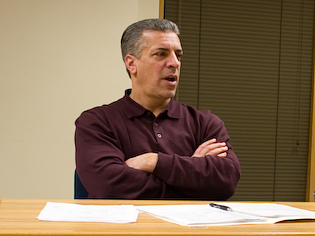 When the city arranged to sell a former brewery for $1, it didn’t advertise the bargain price. There was no public bidding. Just a chat with the one chosen buyer.
When the city arranged to sell a former brewery for $1, it didn’t advertise the bargain price. There was no public bidding. Just a chat with the one chosen buyer.
The building in question, at 458 Grand, is to be sold to Casper “Cappy” Amodio, the developer who revitalized the Erector Square complex. The city acquired the riverside building, a former brewery, in 2002. It has been abandoned for over ten years. (See previous coverage here and here.)
According to an online appraisal database, 458 Grand Ave. is valued at $287,490. Amodio will be purchasing it for $1.
In a previous attempt to sell the building, the city was offered more than a half-million dollars, although that deal fell through.
Frank D’Amore (pictured above), deputy director of the Livable City Initiative (LCI), acknowledged that he worked out a deal with Amodio without advertising the $1 price or holding a public bidding process. He insisted that the process was transparent and by the books.
He said that LCI has in the past put out two Requests For Proposals (RFPs) to try to sell the building. The most recent was over two years ago. Since then, he said LCI has been looking for buyers through referrals only.
In a recent phone conversation, D’Amore described how he had worked out the deal with Amodio.
“I ran it by him,” D’Amore said. “I said, ‘Take a look … We’re desperate’”
They did a walk-through of the building (pictured). Amodio saw potential. D’Amore said that Amodio told him, “‘If the city would work with me, I could make it happen.’”
“I said, ‘Absolutely,’” D’Amore recounted. “He said, ‘I’ll take it for a buck.’”
Deal.
“The price was always negotiable,” D’Amore said. “There’s normally no set price on these things.”
D’Amore estimated that the building will require about $1 million of renovations. Plus, there is $50,000 of mandatory environmental clean-up to be done inside the building, which he said that Amodio has agreed to take on.
“It doesn’t get any better than this,” D’Amore said.
Transparency
Recently retired New Haven State Rep. Bill Dyson said the the sale should not have been arranged behind closed doors, without public bidding.
“I would think that for a project like that there ought to be some open process,” said Bill Dyson. “ For others to have an equal chance.”
“There are a lot of questions that are unanswered,” he continued. “Would anybody else have been interested? … Why wasn’t it advertised so others could be aware of the opportunity?”
“It wasn’t transparent at all,” Dyson said.
“I think we’re very transparent in everything we do,“responded D’Amore,. “We don’t close the door on anyone.”
Asked about holding a public bidding process and advertising the sale of the building, D’Amore replied, “The problem with that is that we’ve done so much of that.”
“There have been at least two RFPs, and numerous people were aware of it,” D’Amore continued. He said that they have had a few potential buyers in the past who have not worked out. “It’s a lot of work going through it with these guys.”
“We’ve done due diligence in the past,” D’Amore said.
“There’s always Monday morning quarterbacks that call and say ‘I wish I’d known about it.’” D’Amore said. “And I’m like, ‘We’re always here… It’s on the website… At any point you can call me.’”
“A lot of people will say, ‘We should have been aware.’” D’Amore said.
A White Elephant
Fair Haven developer Angelo Reyes was unaware of the deal.
“I heard about it after it went down,” he said.
Reyes said that he tried to buy the same building “years ago,” for $575,000.
“Back then the market was different, the neighborhood was different,” Reyes said. “It’s all about who has more money right now.”
Reyes said that he’s not bothered by the unpublicized, $1 deal. “I don’t have a problem with it because he [Amodio] doesn’t have any political bearing in the city.”
“I’m OK with it because of the money he’s going to pump into it.” Reyes said. “It’s his moment. He’s got the money.”
New Haven State Rep. Robert Megna, a sometimes critic of how the city does business, said the $1 sales price didn’t bother him. He contrasted the sale of the brewery with the $1 sale of the Shartenberg site, which he had opposed. “I didn’t like that because that [the Shartenberg site] had market value,” Megna explained. “With this property it was established that it had a negative value.”
“This place had been a real white elephant,” Megna said, pointing out that the property had been difficult for the city to sell and expensive to maintain.
However, Megna cautioned that properties can be worth more than they seem. He said the city should be wary of buyers who might be able to lock in a discounted price, only to turn around and resell the building for a profit.
He said he did have some doubts about the selling process for the brewery.
“Maybe this building does have a market value greater than a dollar,” Megan said. “Maybe they should have put it on the market… Maybe there’s more value than you think.”
“They should make sure the taxpayer gets the best out of the buyer,” he said.